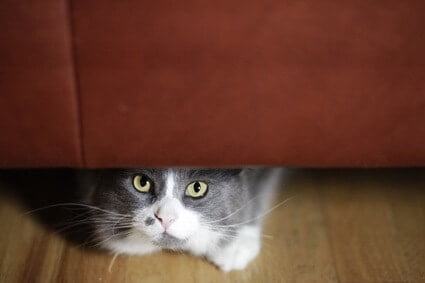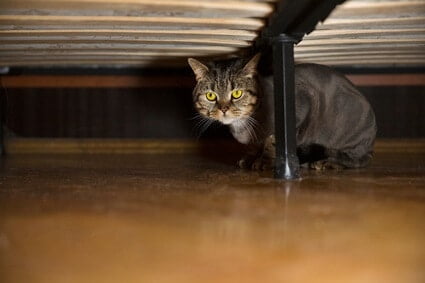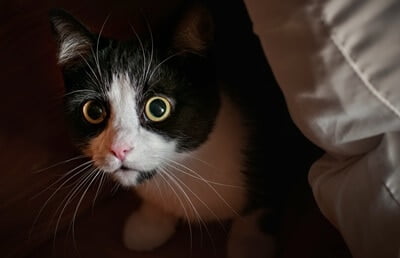On the surface, cats are confident animals that show no fear. Alas, this is mere bravado. Most cats are bundles of nerves and anxiety, living in a near-constant state of fear. For a scared cat, hiding is instinctive, and many felines gravitate to dark places in such instances.
Cats hide in dark places to protect themselves from danger. While located in a dark place, a cat cannot be seen. Equally, superior vision in dim lighting means that it can react quickly to any threat. Cats may hide in dark corners from other pets or new humans in a home. Equally, the cat may be recovering from overstimulation or even physical or emotional trauma.
While hiding is a way of life for domesticated cats, it should not come to define your pet. While all cats hide on occasion, they must also be comfortable in open space. If your cat spends more time in darkness than light, something may be amiss in its living environment.
Is Hiding Normal in Cats?
If you have a cat, you will be familiar with the feline instinct to hide. In most cases, hiding is a natural way for cats to remove themselves from nerve-wracking situations. As explained by PLoS One, hiding greatly reduces the physical impact of stress on felines.
If you’re wondering what your cat could have to be stressed about, it is everything. While cats appear bold and brassy, many domesticated felines are anxious. In addition to stress, cats can often grow overstimulated.
Some cats are more instinctively nervous than others, but all felines experience some measure of stress. This is born of the feline hunting instinct. While cats are natural predators, they understand they could just as easily become prey.
Over time, your cat should learn to trust you and feel safe in your home. Unfortunately, this can take time and patience. Even when you gain a cat’s trust, most felines will retain a hiding place. This is the cat’s “safe space” and must be respected.
Why Do Cats Hide in Dark Places?
Felines frequently prefer to hide in dark locations. “Why is my cat hiding in the corner?” is a common question posed by cat owners. Other locations that you’ll often find a cat hiding include:
- Under a bed or the sofa
- In a closet or drawer
- In a laundry hamper
- Under a blanket or behind curtains
- In a litter box, especially if hooded
Cats will choose a dark place as a hiding place for their protection. The darker a location, the harder it will be for the cat to be seen. The ability to conceal itself is important to any feline.
Darkness also provides a cat with other advantages. The most prominent of these is eyesight. As per the Journal of Neurophysiology, cats have enviable eyesight in dim lighting. This means that, when shrouded in darkness, cats can react rapidly to any potential threat.
As a result, cats are more contented hiding under a cloak of darkness. While cats will eventually grow comfortable in brighter, more open spaces, most felines will eventually revert to form and seek solace in a dim locale.

Why is My Cat Hiding Suddenly?
As discussed, hiding is to be expected in cats. Sudden changes in behavior are always worthy of consideration, though. If your previously bold and confident cat has taken to prolonged periods of hiding in dark spaces, something is wrong.
While your first thought may be to worry that ill health is at play, this is not necessarily the case. Before you rush to a vet, consider if anything has changed. Change is anathema to felines, as these animals relish routine. Any deviation from the norm can cause stress.
Let’s consider the most common explanation for your cat to start hiding in dark places suddenly. If you recognize any of these issues, it is your responsibility to restore a cat’s natural equilibrium and confidence.
Playing
Before assigning any other explanation to hiding in the dark, ensure that your cat is not simply playing. Cats love to hunt, and human ankles can be tempting prey. If you find that your cat hides in dark places then pounces on you, it’s likely in the name of recreation.
This may be fun for your cat, but it’s not a safe or sustainable play style. Eventually, one of you is likely to get hurt. You will need to train your cat out of this behavior.
You cannot yell at your cat to stop and certainly cannot adopt any physical admonishment. The simplest solution is to play with your cat more traditionally.
Set aside a minimum of two 20-minute playtimes each day. Your cat has strong hunting instincts, so build the games around this. Stalking and pouncing on a stringed toy should sate your pet’s hunting instincts.
Overstimulation
Another reason for a cat to hide in the dark may be overstimulation. As cats are constantly aware of their surroundings, they can grow overstimulated. Felines are vigilant for any movement, and their acute hearing dictates that excessive noise can grow wearying.
We also previously touched upon a cat’s ability to see in dim lighting. This is because the shape of the feline eye allows more light to enter. Unfortunately, this leaves cats sensitive to bright or intense light. Prolonged exposure can cause pain and discomfort.
Retiring to a dark, quiet place allows a cat some much-needed respite. If you find your cat growing overstimulated regularly, consider how you can help it relax. You may wish to invest in blackout blinds or simply close curtains to provide a balance of light and dark.
Guarding Territory
The more time cats spend in one location, the more attached they grow to it. Your cat may have started out hiding in a dark area as they were spooked or anxious. Over time, it may have grown to consider this spot to be assigned territory.
Cats need territory to call their own. The only concern is when a cat grows overly attached and guards this terrain jealously. You may find that the cat refuses to allow anybody else to approach this part of the home, remaining in situ to prevent this from happening.
This can grow problematic. If your cat has claimed the inside of a closet, for example, you may be hissed at or scratched whenever you try to retrieve clothing. Ensure the cat has other territories in the home and does not grow too possessive.
Changes in the Home
Cats loathe and fear change. This means that any alteration to a daily routine will result in disquiet. You will need to show patience to manage this. Your cat will likely grow apprehensive and seek safety under the cover of darkness.
Moving House
If you have recently moved house, a cat hiding in your new home is to be expected. You have uprooted the cat from everything it knew. In the cat’s mind, it needs to learn the layout of this new terrain – and, more importantly, learn of any potential hazards.
Never force a cat into the open after moving home. Let your cat hide for as long as it sees fit. Eventually, curiosity will overpower caution, and the cat will express a desire to explore. Until such a time, conduct your business as normal.
New Pets
Bringing a new pet into a home will always take a toll on a resident feline. Cats can learn to get along in time. Even if two cats tolerate each other, that’s a win. Before this co-existence becomes a realistic option, there will be a period of consternation.
Older cats hiding from new kittens is to be expected. Senior cats are typically at a life stage where they are winding down. Kittens, meanwhile, are filled with playful energy. This can grow tiresome and exhausting for a feline that is heading toward its dotage.
Equally, a resident cat hiding from new cats should be expected. As cats are territorial, there may be some squabbling over alpha status in the home. A resident cat may meet this challenge head-on – or it may prefer to hide and stay out of the way.
This hiding cannot last forever. It is unfair on your existing cat to expect it to remain out of sight and mind in a dark place for the rest of its days. Do all you can to make both pets comfortable sharing a space. If you’re fortunate, a friendship will bloom.
Houseguests or New Family Members
Unfamiliar humans can cause just as much consternation in cats as animals. If you bring home a new baby, do not expect your cat to share your joy immediately. The cat will be perturbed by this noisy new arrival that demands your attention. It will need time to adapt.
Equally, if you have a houseguest, expect your cat to fear them initially. Some cats automatically fear the worst from humans until certain they mean no harm. Encourage your guest to ignore the cat initially. Unwanted handling, in particular, is ill-advised.
You may find that cats are terrified of certain people, seemingly for no reason. This is likely due to a memory of trauma. Cat senses do not immediately allow for nuanced differences between humans.
For example, to a feline, all men with beards and deep voices are identical. If such a person mistreated the cat in the past, they will automatically fear this new arrival to the home. The cat will need time to learn to trust that this particular human is not a danger.
Rearrangement of Furniture
Even something as prosaic as rearranging furniture in a home can upset a feline. In the mind of a cat, everything in a home belongs to it. By moving furniture around, you have invaded and spoiled pre-claimed territory.
If you rearrange the furniture in your home, try to leave food, water, beds, and litter in a familiar location. This will be less discombobulating for a cat, as it still knows where to find such essential resources. If possible, leave a favored spot untouched too.
If your cat gravitates to the corner of a room, for example, it has claimed this part of the house as territory. By leaving this area alone, your cat is less likely to hide to destress – and, more importantly, is unlikely to scratch furniture to claim new terrain.
Physical or Emotional Trauma
As mentioned, cats are anxious animals. Felines are constantly on the alert for potential danger. If a cat undergoes a painful or frightening experience, this cements its worst fears. The cat will believe the world is every bit as dangerous as initially suspected.
Understandably, this will lead to hiding behaviors. A traumatized cat will immediately seek out what is considered a safe space. The cat will remain here until it is confident the danger has passed.
How long this takes depends on the cat in question and what sparked such jitteriness. Some cats recover from a negative experience in short order. Others need to rebuild their confidence gradually. Let your cat rejoin you at its own pace.
While you are waiting for this, go about your business as normal. You can make a little fuss of your cat, offering reassurance or treats after a frightening experience. Just avoid mollycoddling your pet. At best, your cat will grow used to this and manipulate you into meeting its wishes. At worst, you will cement fears that the cat has something more to fear.

Veterinary Appointments
A cat hiding after a vet visit is always to be expected. Visiting a health professional, whether for dental surgery, vaccinations and boosters, or even a general check-up, can be traumatic for felines. It involves no end of unwelcome handling, prodding, and poking.
Upon your return home, leave the cat in peace for a while. Locating a dark place to destress is the first thing most cats will do after visiting the vet. If you’re patient, the cat will emerge when it is ready. Usually, this will be around a scheduled mealtime.
Accept that your cat may be a little cranky for a few days. You will likely be held responsible for any perceived mistreatment at the hands of a vet. If your bond is strong, this will pass. While cats can hold a grudge, most forgive a trusted owner before long.
Frightening Interactions
Hiding in cats also frequently follows a frightening interaction. This could have been with another pet in your home, a neighborhood animal, or even yourself. It’s easy to frighten and traumatize a cat inadvertently.
If you find yourself asking, “is my cat hiding from me?” follow this up by reviewing if any of the following incidents have recently occurred:
- You recently raised your voice to your cat, or in its presence
- You accidentally inflicted pain upon your cat, such as treading on its tail
- You have been handling your cat more than usual
- You have been applying intrusive medications to your cat
If you answered yes to these questions, your pet may be starting to fear you. The trust of a feline is hard to gain and easy to lose, so be mindful of this. Take the time and care to demonstrate that you are no threat to the safety of your cat.
Your cat may also have been frightened by another animal. If you keep multiple cats in the same home, conflict is inevitable. As per the Journal of Feline Medicine and Surgery, pheromone sprays can help manage this and keep all pets calm.
Equally, a cat that roams outside may have encountered an aggressive neighborhood feline or a loud, barking dog. Such interactions can leave cats on edge, even in the safety of their own home. Keep the cat indoors, and let it hide until it recovers from such an ordeal.
Tempting a Cat Out of Hiding
If your cat insists on hiding in dark places, you may need to move them on occasion. Hiding under blankets, for example, is potentially dangerous. It’s easy to accidentally hurt a cat that you did not realize was in such a position.
Convincing a cat to come out of hiding requires delicacy. This table explains which techniques are acceptable and which are not:
| Do | Do Not |
|---|---|
| Keep your distance so that the cat feels safe | Physically drag the cat by the paws or tail |
| Provide tempting treats and toys | Shoo the cat with a broom handle |
| Speak softly and calmly to reassure the cat | Scold or yell at the cat |
| Go about your business as normal | Spook the cat with loud noises |
Once you have tempted your cat out of hiding, watch its general demeanor. If the cat goes about its business as normal, the hiding was a one-off. If it immediately attempts to return to the hiding spot, learn why it is so uncomfortable in the open and resolve the problem.
Is Hiding in Cats Worrying?
For many owners, reporting that their cat is hiding and acting weird is commonplace. Felines display a wide range of behaviors, many of which are baffling by human standards. This does not mean that you write off the action as cats just being cats, though.
While hiding is perfectly normal cat behavior, your pet should emerge on occasion. If there is no way of tempting your cat out of its hiding place, something is amiss. Refer back to the list of potential explanations above and pinpoint the likeliest explanation.
In most instances, you will be able to rectify the issue yourself. You may need to seek professional advice, though. Make an appointment with a veterinarian if any of the following applies.
- Your cat is hiding and not eating
- The cat grows aggressive when you try to remove it from its hiding place
- Hiding is accompanied by weight loss
- The hiding becomes more commonplace than roaming
In any of these circumstances, have your cat examined. There is every likelihood that your cat is unwell, and the hiding is a reaction to this. Cats stay out of the way if they feel under the weather. They do not want a potential rival to notice their weakened state.
Overall, hiding is rarely a concern in cats. This behavior comes as naturally to felines as hunting and eating. Cats will naturally gravitate to dark places to hide, as their eyesight is superior in dim lighting. Just keep an eye on the behavior, seeking advice if it grows problematic.


Stanley came to live with me a month ago. I am his 3rd home this year. He was originally one of 3. Then 1 of 6 house cats, but he upset the other cats when feeding.
Now he is a lone cat, who hides under the bed until it is dark. He’s eating & drinking well, and will play with toys – on his own. He’s gradually getting used to me & my wheelchair. He will sit in the dark a few feet away for a few minutes before scuttling away.
Does he just need time? What else can I do to encourage him to become a daytime cat? I so want to cuddle him!!
My cat is doing the same thing. ,she was found in a barn on a farm .then shelter,I adapted from there. Hides all day ,when I’m asleep ,she comes out to eat,and goes in her litter box,then back to hiding .